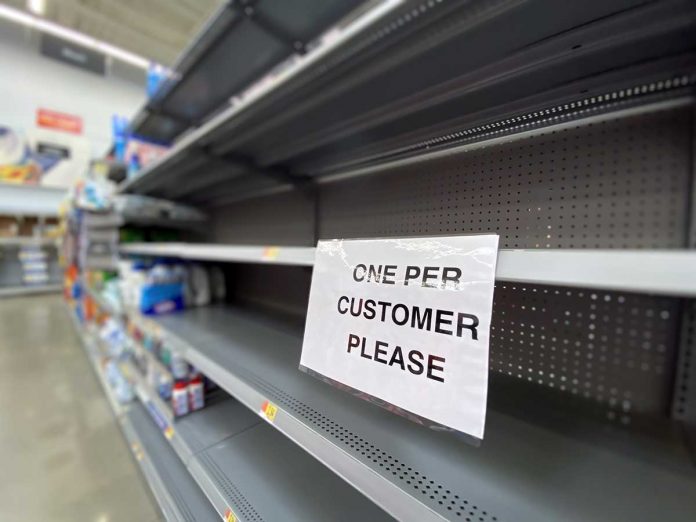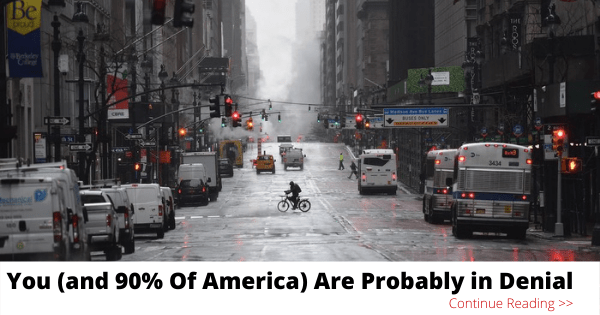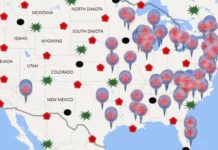All of us have seen the grocery stores, and how food and other items fly off the shelves. It’s obvious people are panicking and grabbing all they can, sparking runs on things like toilet paper.
This will apparently not stop anytime soon, as it appears that many of the same people are returning to the store again and again, hoarding things, rather than just buying what they need for the conceivable future.
I think it’s important to note that these people are quite different from the preppers because they’re panic buying instead of building a well-reasoned stockpile.
There’s also a lot of them doing it at the same time, rather than over a long period of time, building up their stockpile gradually.
This rush and panic buying is which that causes the current shortages.
Things immediately got to a point where the fear fuelled itself. People who went to the store for a few necessities saw what was going on, and began buying, motivated by the empty shelves they saw.
We have to remember there is no shortage of food or even toilet paper. Because of this panic buying the apparent shortage has come about.
The supply chain is stretching beyond the breaking point, as truckers work overtime to rush the product into the shelves of the store and make up for the buying frenzy that is going on.
Related: 30 Survival Items To Get In The First 30 Days Of Prepping
Buy Strategically
If you need anything you don’t have, the early morning when the stores first open is the time to get it.
Many shops have shortened their hours to clean and restock the night shift. So the shelves are the fullest they’ll be the first thing in the morning, before the rush hits. That rush begins to hit as soon as the doors open.
While the president called for a two-week lockdown, chances are, on CDC ‘s advice, that timeframe will be extended.
Some self-proclaimed “experts” claim the lockdown extends to June. But these are all guesses, because the president and his closest advisors don’t know what to do yet.
They wait to see what results the current lockdown has and then try to project what will happen if they continue the lockdown and what if they don’t.
It only makes sense to increase your stockpile if you don’t already have enough.
That raises the question, “What should you stockpile? “No doubt this crisis is different from those we’ve all prepared for.
Does following those rules make sense? Or are there new rules for this situation?
The answer is actually quite simple. While the current pandemic is very similar to a number of other disaster scenarios we’ve all talked about, there’s an overriding difference affecting everything … we have electricity. So our refrigerated, frozen food won’t go bad.


What Will You Need?
With that out of the way, what foods should you store? I’ll just restrict myself to food here, because I think we all know we need a hand sanitizer and a rubbing alcohol.
Many of the grocery chains and big box stores limit buying a long list of items they currently run shortages on.
This means that part of our buying strategy must be to make sure we buy those items when we can; banking them for the day when we can’t get them, but need them. We don’t need to go overboard, but we want to make sure we have what we need.
Personally, my wife and I agreed not to add to the issue by buying more than we need.
Although I might buy food worth six months, I’m not. I’m limited to what I need to do next month or two. But we are constantly re-evaluating the situation and can make adjustments as we see fit.
- Meat, Poultry & Fish – Protein is an essential macronutrient primarily from animals. Buy what you can, freeze it. If I can buy big “family packs” and then repack them for freezing.
- Fresh Fruits & Vegetables – Stick to hardy ones, which won’t go bad in the fridge. Apples last longer than bananas, cabbage and celery last longer than lettuce.
- Rice Cakes – Bread flies off shelves, but every time I went to the store, I saw rice cakes. They ‘re a good replacement for that bread once you ‘re used to them.
- Soup Base & Bouillon – You can make anything into a soup that’s especially useful if you have picky eaters who don’t like the rest. Oatmeal – makes a heartier breakfast and doesn’t go stale like breakfast cereals.
- Dried Fruit – it hasn’t flown off the shelves, although canned has. The dried is just good for snacking, cooking or desert.
- Frozen vegetables – a staple in your family ‘s diet.
- Pasta & Rice – Decent staples, hard to find.
- Dried beans – depending on their role of your usual diet. If you don’t normally eat them, you don’t have to start this crisis.
- Canned Vegetables & Fruit – There’s no need if you already have these in your stockpile; but if you don’t have them, they ‘re a perfect backup to your fresh food options.
- Milk & Eggs – Get while you can. Milk won’t last long, but eggs will. You’ll probably go through more with everyone at home.
- Powdered milk – Most people don’t like powdered milk, but it can be cooked, especially baking. It can also be used to extend your milk supply, mixing half-and-half with whole milk to enhance the flavor.
Related: The Biggest Stockpiling Mistakes
What Not to Stockpile
There are a few items I wouldn’t bother storing, more than your normal use:
- Water – If you have water filtration, you don’t need to store water.
- Junk Food – This may be an ideal opportunity to make your family eat healthier. Make sure you have plenty for snacks.
- Frozen Breakfast Products – It’s not hard to cook these, so why bother?
- Frozen bread items – they ‘re terribly expensive to get.
- Frozen Pizza – I ‘d rather support my local small business than buy pizza from a pizzeria.
- Food In Your Stockpile – If you already have things in your food supply, there’s no need to buy more now. That’s what you’ve stockpiled for. Leave what’s for people who didn’t think ahead.
Related: Year-Long Guide to Stockpiling
Whatever you do, it’s time to think through. You have had the luxury of time to mentally prepare for a crisis, unlike other people out there.
We don’t need to panic or follow the herd instinct. Instead, we ‘re the ones marching to another drum ‘s beat; that of the prepared.





















